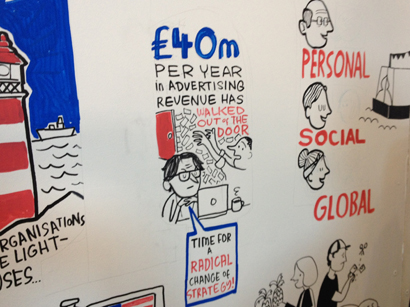Alan Rusbridger, editor of the Guardian, today asked readers what they were prepared to give back to the news group in return for journalism: money, time or data.
The first option, to ask readers to pay for an online subscription, “has not been ruled out”, Rusbridger told a session called “what might the Guardian’s future look like?” at the Guardian Open Weekend.
He suggested readers could give their time, perhaps volunteering to work shifts when they would moderate comments from fellow readers, a suggestion that is perhaps equally as surprising and seemingly unlikely as the idea of the Guardian putting up a paywall.
The third option Rusbridger proposed was that readers share personal data, such as their postcode.
All three options aim to make or save money, helping to compensate for the “£40 million-a-year which walked out the door” with the rapid decline in newspaper advertising.
You have to work on the basis that [revenue] is never going to come back.
Rusbridger added:
There are huge opportunities for journalism but it’s going to be a period of intense change.
In the same session, Andrew Miller, CEO of Guardian Media Group, explained the group is focussing on brand building, saying sustainability via digital relies on far more than “banners and buttons”.
Miller said:
The newspaper is fantastic product but is one of many products that people use to consume news.
Miller commented on the revenue generated by the Guardian’s Facebook app, launched in September – which has been downloaded by eight million users in six months and which saw Facebook users read 19 million articles via the app last month – saying “we only make a few hundred thousand pounds” via the app.
Earlier this week Journalism.co.uk reported that the Guardian app has generated more money than it cost to build.
Also speaking in the session was Janine Gibson, editor-in-chief of the Guardian US operation who seven months ago “took the Guardian-ness and put it in America”.
She talked about how the “audience is growing substantially” in the US.
We are trying to make [the audience] feel they are part of the international army of Guardian readers.

I will give my money…for one good reason. Eventually, all media reflect their audience, not the other way around. If the Guardian seeis to make up for lost revenue by seeking a larger audience, they will end up like SkyTV or the dreadful Fox News is the USA- institutions that have large audiences because they only reenforce the prejudices of their viewers. The only way to attract the rabble is to post things that the rabble enjoy. This process is insidious and progressive. Quality newspapers were never read by more than about 25% of the population. They have always been the voice of one, crying in the desert. But this gave them the power to occasionally shake the world. Abandon your conceit that you might speak to everyone; you will only succeed at entertaining everyone occasionally. Go back to your readers, Guardian. They are a minority, but a wealthy one.
Pingback: Rusbridger: Guardian paywall ‘has not been ruled out’ [Journalism.co.uk] « GeorgeHopkin.com
Pingback: Don’t build a paywall, create a velvet rope instead — Tech News and Analysis
Pingback: The Guardian’s 10 ‘rules’ of Open Journalism… and money « Journomel.com
Pingback: The Guardian : En quête d’un modèle économique viable | Le blog de MonArtiste The Guardian : En quête d’un modèle économique viable | analyse les nouvelles pistes de financement
Pingback: Nuove Fonti di Ricavo per l’Industria dell’Informazione « EJO – European Journalism Observatory
Pingback: Rusbridger: Guardian paywall ‘has not been ruled out’ | Editors’ Blog | Journalism.co.uk | New Media Technologies & Convergence